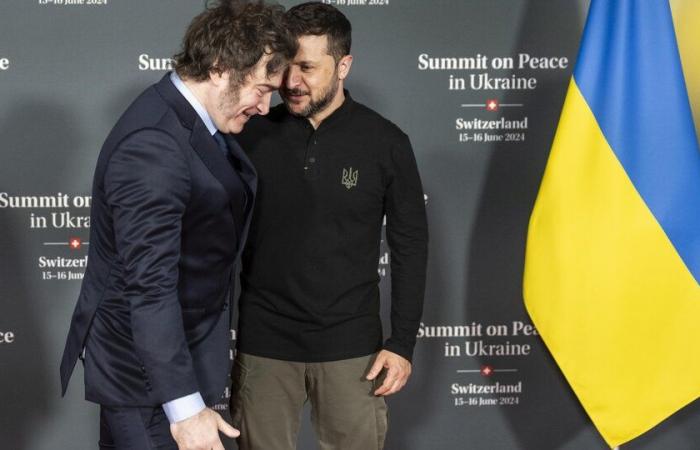
Javier Milei concluded his European excursion yesterday in Switzerland with a brief speech at the so-called Global Summit for Peace in Ukraine, where he supported his “friend” President Volodimir Zelensky, repeated his refrain about the ideas of freedom and assured that he had “full awareness of the value of peace and democratic coexistence as guiding axes of life in society.” His presence at a meeting designed to accentuate pressure on Russia, added to the participation of Minister Luis Petri in a meeting of the Contact Group for the Defense of Ukraine, generated “deep disappointment” in Russian diplomacy, whose ambassador in the country repudiated “the rapprochement between Buenos Aires and the military sponsors of Ukraine.” The distinctive note of the summit was carried out by the Colombian Gustavo Petro, who decided not to. participate because “its conclusions are predetermined” and asked Europe “to debate the ways to shorten the war and not to extend it.”
After attending the G7 summit in Italy as a guest, Milei, together with the delegation led by Sister Karina, picked up the chancellor (on a tightrope) Diana Mondino in Bari, whom he only included on the Swiss stopover. From Zurich they moved to Bürgenstock, near Lucerne, where the meeting organized by Zelensky and the European Union took place within the framework of NATO’s war with Russia on Ukrainian territory.
After admitting his “honor” for the invitation and for the “close bond” with Zelensky, with whom he shares a theatrical past, Milei began the reading of his brief speech with a phrase foreign to his vocabulary, highlighting that “we Argentines have full awareness of the value of peace and democratic coexistence as guiding axes of life in society.” He expressed support “for the people of Ukraine” and for the “friend” who presides over it because “as defenders of the idea of freedom we repudiate any form of violence”, a novelty for those who practice it regularly, he never condemned the terrorism of State in his country and openly supports Israel’s massacre in Gaza.
Judging by the text he read yesterday, Milei considers war as an “illegitimate mechanism to resolve conflicts between nations.” “War is the last resort of a people that must defend itself, nothing more and nothing less,” he said. He repeated the usual script about liberty, the right to life and private property, and suggested that “there is a direct relationship between peace, commerce and prosperity.” Invoking the economist Milton Friedman, he explained that “I can hate my neighbor, but if he doesn’t buy my product, I’m going to go bankrupt,” reasoning that contradicts his behavior at the head of the Executive, where by dint of outbursts he has known how to dynamite commercial relations. with several of Argentina’s main partners.
“I think it is an important step for Argentina to be able to be present first at the G7 summit and then here, at this Peace Summit. And it is part of the great turn we are taking as a country after decades of turning our backs on the world,” she amazed. “There is a new Argentina that embraces once again the ideas that 150 years ago made it one of the most prosperous countries in the world” and that “seeks to recover the leading place in the concert of nations that it once had and never should have.” having abandoned,” he added, and concluded that “for us peace among free nations is not only a moral duty, but the necessary condition for prosperity.”
More than 50 leaders participated in the summit in Switzerland, including Rishi Sunak (United Kingdom), Emmanuel Macron (France), Olaf Scholz (Germany), Fumio Kishida (Japan), Mark Rutte (Netherlands), Pedro Sánchez (Spain), Marcelo Rebelo de Sousa (Portugal), Ulf Kristersson (Sweden), Alexander De Croo (Belgium), Justin Trudeau (Canada) and Mette Frederiksen (Denmark). Also present in Latin America were Gabriel Boric (Chile), Stephan Brunner Neibig (Costa Rica), Luis Rodolfo Abinader Corona (Dominican Republic) and Daniel Noboa (Ecuador).
Petro justified his decision not to attend by saying that “it is not a free forum to discuss the paths to peace between Russia and Ukraine” since “its conclusions are already predetermined.” “Most of Latin America and the Colombian government do not agree with extending the war. “We did not join political blocs for war,” he differentiated himself. After participating in a tribute to former Swedish Prime Minister Olof Palme, murdered after “raising the flag of world peace and Social Justice,” the Colombian explained on his X account why he suspended his trip to Switzerland, he asked Europe “debate ways to shorten the war and not extend it,” and proposed “the establishment of a security zone without nuclear weapons that physically separates NATO from Russia.” He guaranteed Colombia’s effort to build dialogue and also “to stop the genocide on the Palestinian people.” “It is international law that has to be reestablished and deepened and not the constitution of blocks of countries for war,” he concluded.
In the antipodes of Petro, Milei’s hugs with his Ukrainian counterpart and Petri’s presence in Geneva, at a meeting of the Contact Group for the Defense of Ukraine, were criticized by the Russian ambassador in Buenos Aires, Dmitry Feoktistov. “Regarding the participation of the Argentine Minister of Defense, there are still no official comments from the Argentine side. The certain fact of the rapprochement between Buenos Aires and the military sponsors of Ukraine causes us deep disappointment,” he told the press in his country. He framed the Libertarian government’s decisions within the framework of its request to have “global partner status” of NATO and confessed not understanding “how granting this status can improve Argentina’s security.” He expressed his hope that the country would refrain from interfering in the conflict in Ukraine “while maintaining its traditional moderation” and being able to “preserve the friendly nature of Russian-Argentine relations, which have historically been immune to political tendencies.”





